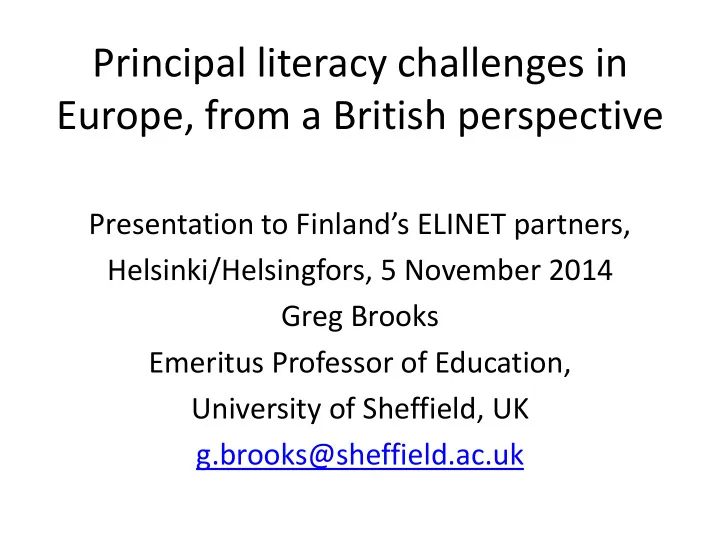

Principal literacy challenges in Europe, from a British perspective Presentation to Finland’s ELINET partners, Helsinki/Helsingfors, 5 November 2014 Greg Brooks Emeritus Professor of Education, University of Sheffield, UK g.brooks@sheffield.ac.uk
Smallest continent With the most countries (51 according to https://www.countries-ofthe- world.com/countries-of-europe.html) And at least 80 indigenous languages, belonging to about 8 language families, written in at least 6 scripts (without taking account of recently- arrived communities)
Within ELINET • 28 countries (24 EU) • 24 official languages, from 4 language families, in 3 scripts • Significant diversity of cultures and educational systems and traditions • So what do we tackle, and how?
Within ELINET • 28 countries (24 EU) • 24 official languages, in 3 scripts • Significant diversity of cultures and educational systems and traditions • So what do we tackle, and how?
Learn from each other Poor example: ‘Vision for Literacy 2025’ launched at Houses of Parliament, London, 29 October • Nothing about what is happening across Europe • Nothing about adults
Adults’ skills • HLG (p.81) recommended: ‘Gather evidence of adult literacy programmes’ effectiveness through long- term monitoring’ PIAAC is a start, but countries need their own surveys; also programmes & methods of evaluating them
Get things right from the start • Yes, there will always be a need for catch-up interventions • And yes, there will always be adults who fell through all the nets and need help • But every country in Europe could reduce the number of children who don’t make a good enough start • = Intervene early (preschool language, etc., programmes) & improve teaching (primary)
How are teachers trained to teach literacy? • Eurydice report based mainly on official documents • University of Cologne proposed TeachRead project – EC did not fund • FELA mounted small-scale exercise on what actually happens • But in any case all of this presupposes common understanding of pedagogies
Survey and glossary • Renate Valtin & IDEC devising survey of how reading and writing are actually taught across our member organisations; last survey in 1973 • ELINET has commissioned Maxine Burton & me to devise a glossary of terms in initial literacy teaching ; IRA’s Literacy Dictionary heavily Anglophone & getting out of date (1995); ours will be analytic, not just a list • Survey & glossary are complementary
Incomprehension • ‘Explication de texte ’ - I think I understand this one But • ‘ Méthode globale ’ escapes me. - IRA Dictionary calls it ‘global method’ & says it ‘has many parallels to the language experience and whole language approaches’ (??)
A sketch of an analysis • Of the initial teaching of reading (can be adapted for spelling; compositional aspect of writing more complicated) • In an alphabetic orthography • In official languages of FELA countries • (but not of phonemic awareness as precursor) • (& not of attempts to teach silent reading from outset) • Tell me if it makes (initial) sense • In particular, stop me if I’m teaching you to suck eggs
‘Tabula rasa’ MEANING Spoken language Written language
Which of you can’t remember … • Not being able to read? / • Learning to read? How did you learn?
Which of you can’t remember … • Not being able to read? / • Learning to read? How did you learn? ‘At mother’s knee’ ? (father’s?)
Julia Donaldson, UK Children’s Laureate, 2011 -13 “A child will be able to recite a rhyming book that is read to them before they can read it. And then, when they get older, they can suddenly decipher the words that they recognise the sound of from memory. That’s very gratifying to a child and helps with reading.”
‘See what you say’ (Margaret Meek) MEANING Spoken language Written language
‘See what you say’ (Margaret Meek) MEANING Spoken language Written language
For the others: ‘Say what you see’ MEANING Spoken language Written language
For the others: ‘Say what you see’ MEANING Spoken language Written language
At what linguistic level? Speech Writing Levels Method(s) Tone group Sentence sentence methods, whole language Word Word look & say, méthode globale (?) Syllable ‘Syllable’ syllabic/alphabetic methods Subsyllabic units Onset and rime analogy Phonemes Graphemes phonics
At what linguistic level? Speech Writing Levels Method(s) meaning-emphasis Tone group Sentence sentence methods, whole language Word Word look & say, méthode globale (?) ________________________________________________________ Syllable ‘Syllable’ syllabic/alphabetic methods Subsyllabic units Onset and rime analogy Phonemes Graphemes phonics code-emphasis
Synthetic phonics for reading MEANING Spoken word Written word synthesis analysis (blending) (identifying graphemes) phonemes grapheme-phoneme translation graphemes (= sounding out for reading)
BUT • Education cannot compensate for all of society’s ills • It can contribute, powerfully • But too many children’s life chances are blighted long before they get to school
The big demons • Poverty and inequality • Governments’ responsibilities: - Restore & maintain full employment - Reduce poverty - Avoid short-termism; education is a relentless duty
Equity and quality • Are not mutually exclusive • Pasi Sahlberg Finnish Lessons has shown that countries with most equity also have best educational outcomes • So cause-and-effect is from greater equity to better education, not vice versa
But we must also play our part Many thanks! g.brooks@sheffield.ac.uk
Recommend
More recommend